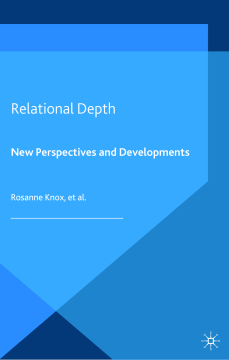
Additional Information
Book Details
Abstract
As a therapist, have you ever experienced moments of absolute trust, understanding and empathy with a client? Such moments of relational depth can feel like a therapeutic breakthrough for the therapist. But what is the client's experience? And what does the research tell us about the potential therapeutic benefits?
This wide-ranging book offers a fascinating survey of the latest thinking and research on in-depth therapeutic encounters. Combining vivid case studies with the latest research evidence, this book:
• Examines a breadth of perspectives: from working with young clients to working in groups
• Explores relational depth in a wider theoretical context: for example, in relation to dialogue, presence, mutuality and the transpersonal.
• Considers important professional issues, such as how relational depth can be assessed and its value in personal development and supervision contexts.
By exploring the meaning, challenges and experiences of relational depth, it provides insight into an important dimension of therapeutic practice and, for many, will act as a guide to new ways of thinking about their therapeutic relationships.
This book is an essential read for all trainees and practitioners in Counselling and Psychotherapy who want to deepen their levels of therapeutic relating.
ROSANNE KNOX is a Counselling service manager for a national children's charity, and a Person-Centred Therapist in private practice in the UK.
DAVID MURPHY is a Lecturer in Counselling and Trauma Studies at the University of Nottingham, UK.
SUSAN WIGGINS is a Person-Centred Therapist in private practice in the UK.
MICK COOPER is a Professor of Counselling at the School of Psychological Sciences and Health at the University of Strathclyde, UK.
This authoritative text brings together state-of-the-art research and theory, and is an excellent addition to, and development of, the notion of relational depth.' - Sheila Haugh, Senior Lecturer, Metanoia Institute, UK
Table of Contents
| Section Title | Page | Action | Price |
|---|---|---|---|
| Cover | Cover | ||
| Title | iii | ||
| Copyright | iv | ||
| Contents | v | ||
| Foreword | vii | ||
| Acknowledgements | x | ||
| Introduction: the in-depth therapeutic encounter | 1 | ||
| PART I: EXPERIENCE AND EVIDENCE OF RELATIONAL DEPTH | 11 | ||
| 1 Meeting at relational depth in therapy: the lived encounter | 13 | ||
| 2 Relational depth from the client's perspective | 21 | ||
| 3 Therapists' experiences of relational depth with clients with learning disabilities | 36 | ||
| 4 Assessing relational depth: developing the Relational Depth Inventory | 49 | ||
| 5 Experiencing relational depth in therapy: what we know so far | 62 | ||
| PART II: RELATIONAL DEPTH IN CONTEXT | 77 | ||
| 6 Working at relational depth with children and young people | 79 | ||
| 7 Facilitating posttraumatic growth through relational depth | 90 | ||
| 8 Group relational depth | 101 | ||
| 9 Client–therapist diversity: aspiring towards relational depth | 114 | ||
| 10 Supervision and relational depth: a companion on the journey | 125 | ||
| 11 Experiencing relational depth: self-development exercises and reflections | 137 | ||
| PART III: RELATED PERSPECTIVES | 153 | ||
| 12 Dialogue as the foundation of person-centred therapy | 155 | ||
| 13 Therapeutic presence as a foundation for relational depth | 175 | ||
| 14 Mutuality and relational depth in counselling and psychotherapy | 185 | ||
| 15 The Person-centred approach: similarities and differences with relational depth | 196 | ||
| 16 The transpersonal and relational depth | 208 | ||
| 17 Conclusion: where we go from here | 217 | ||
| Index | 221 |
